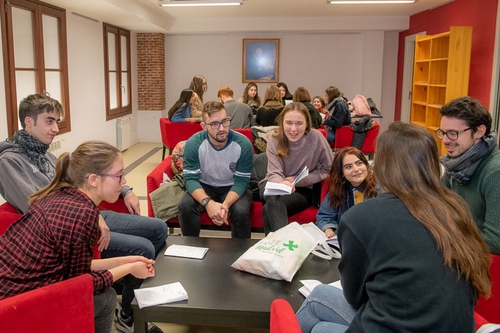Commented Bible Passages
March
Then I saw a new heaven and a new earth, for the first heaven and the first earth had passed away, and there was no longer any sea. I saw the Holy City, New Jerusalem, coming down out of heaven from God, prepared as a bride beautifully dressed for her husband. And I heard a loud voice from the throne saying, “Look! God’s dwelling place is now among the people, and he will dwell with them. They will be his people, and God himself will be with them and be their God. He will wipe every tear from their eyes. There will be no more death or mourning or crying or pain, for the old order of things has passed away.” He who was seated on the throne said, “I am making everything new!” Then he said, “Write this down, for these words are trustworthy and true.” He said to me: “It is done. I am the Alpha and the Omega, the Beginning and the End. To the thirsty I will give water without cost from the spring of the water of life. (Revelation 21:1-6)
At the end of the Book of Revelation, the very last book of the Bible, the author, John, describes a most extraordinary sight: first, a new heaven and a new earth appear to him, then a city descending from heaven. The vision, however startling, is not meant to horrify or impress. This is vision in a different sense. It is fresh perception, a new realization about God, about life and why we are here.
At various points in our lives, all of us can find ourselves asking the question “why?”. Why is the world the way it is? Why has this or that happened? At such moments we try to see better, so as to orient ourselves and grasp what we can of the purpose of things. As believers we try to “see” not with our senses or mind alone. We try to see also with the special help which faith in God gives. So what is it that we see with John? What do we perceive with the eyes of faith? Something so uniquely beautiful that several metaphors are necessary to describe it—a new creation, a heavenly city, a bride adorned in anticipation for her husband-to-be. We see a city fresh and beautiful because love itself makes it shine.
Cities are not just places where people live, but where different kinds of people live together. Interestingly, John sees not several cities but one heavenly city: God envisions human beings living together as one. The city which in the Bible symbolizes God’s promise to his people, Jerusalem, is to become the city of all. The vision would have us perceive a new potentiality within human existence: life becomes truly beautiful, even breathtakingly so, whenever and wherever human beings overcome what divides them and live together as one.
If the harshness of opposition and conflict could make such a vision seem more like fleeting dream than potential reality, we would do well to notice in the vision the downward movement of the city. It does not float off into the heavens. For all its singularity, the city is not otherworldly. Rather it comes down to earth. The heavenly city is an invitation then not to turn our gaze elsewhere but to keep it fixed here. This world, our city, is to be made new. For it to be transformed, we need to look again at those around us. What could possibly inspire us for this? “Look,” John hears a voice saying in verse 3, “God has come to live with humans.”
In taking on our humanity in Jesus Christ, God has wed his life to ours, joined himself totally and irrevocably to our existence. As we search how to respond daily to life in this world, we ask Christ to help us look at others around us and to see our city as God’s city. Each of its inhabitants is worthy of being considered and served, because God, as the voice in the vision tells us, will wipe away every tear. If we should ask, “how can this be”, the words John then hears come in reply: “I am the beginning and the end.” It is not our understanding but God’s good intention which embraces creation. And God gives water for the journey not to the satiated but to the thirsty.
![]() How would I describe the heavenly city of Revelation 21? Can this vision change the way we see the world?
How would I describe the heavenly city of Revelation 21? Can this vision change the way we see the world?
![]() What do the words which John hears suggest to me? How do they affect me?
What do the words which John hears suggest to me? How do they affect me?
 TAIZÉ
TAIZÉ